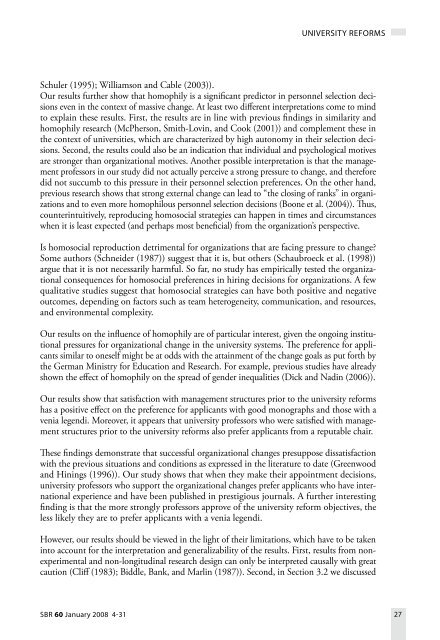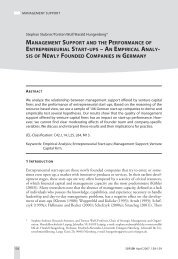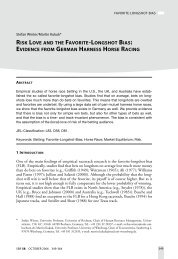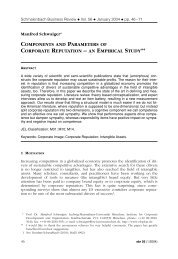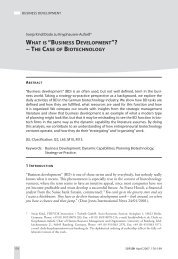“if you don't know what port you are sailing to, no wind is favorable”**
“if you don't know what port you are sailing to, no wind is favorable”**
“if you don't know what port you are sailing to, no wind is favorable”**
Create successful ePaper yourself
Turn your PDF publications into a flip-book with our unique Google optimized e-Paper software.
University reforms<br />
Schuler (1995); Williamson and Cable (2003)).<br />
Our results further show that homophily <strong>is</strong> a significant predic<strong>to</strong>r in personnel selection dec<strong>is</strong>ions<br />
even in the context of massive change. At least two different interpretations come <strong>to</strong> mind<br />
<strong>to</strong> explain these results. First, the results <strong>are</strong> in line with previous findings in similarity and<br />
homophily research (McPherson, Smith-Lovin, and Cook (2001)) and complement these in<br />
the context of universities, which <strong>are</strong> characterized by high au<strong>to</strong><strong>no</strong>my in their selection dec<strong>is</strong>ions.<br />
Second, the results could also be an indication that individual and psychological motives<br />
<strong>are</strong> stronger than organizational motives. A<strong>no</strong>ther possible interpretation <strong>is</strong> that the management<br />
professors in our study did <strong>no</strong>t actually perceive a strong pressure <strong>to</strong> change, and therefore<br />
did <strong>no</strong>t succumb <strong>to</strong> th<strong>is</strong> pressure in their personnel selection preferences. On the other hand,<br />
previous research shows that strong external change can lead <strong>to</strong> “the closing of ranks” in organizations<br />
and <strong>to</strong> even more homophilous personnel selection dec<strong>is</strong>ions (Boone et al. (2004)). Thus,<br />
counterintuitively, reproducing homosocial strategies can happen in times and circumstances<br />
when it <strong>is</strong> least expected (and perhaps most beneficial) from the organization’s perspective.<br />
Is homosocial reproduction detrimental for organizations that <strong>are</strong> facing pressure <strong>to</strong> change?<br />
Some authors (Schneider (1987)) suggest that it <strong>is</strong>, but others (Schaubroeck et al. (1998))<br />
argue that it <strong>is</strong> <strong>no</strong>t necessarily harmful. So far, <strong>no</strong> study has empirically tested the organizational<br />
consequences for homosocial preferences in hiring dec<strong>is</strong>ions for organizations. A few<br />
qualitative studies suggest that homosocial strategies can have both positive and negative<br />
outcomes, depending on fac<strong>to</strong>rs such as team heterogeneity, communication, and resources,<br />
and environmental complexity.<br />
Our results on the influence of homophily <strong>are</strong> of particular interest, given the ongoing institutional<br />
pressures for organizational change in the university systems. The preference for applicants<br />
similar <strong>to</strong> oneself might be at odds with the attainment of the change goals as put forth by<br />
the German Min<strong>is</strong>try for Education and Research. For example, previous studies have already<br />
shown the effect of homophily on the spread of gender inequalities (Dick and Nadin (2006)).<br />
Our results show that sat<strong>is</strong>faction with management structures prior <strong>to</strong> the university reforms<br />
has a positive effect on the preference for applicants with good mo<strong>no</strong>graphs and those with a<br />
venia legendi. Moreover, it appears that university professors who were sat<strong>is</strong>fied with management<br />
structures prior <strong>to</strong> the university reforms also prefer applicants from a reputable chair.<br />
These findings demonstrate that successful organizational changes presuppose d<strong>is</strong>sat<strong>is</strong>faction<br />
with the previous situations and conditions as expressed in the literature <strong>to</strong> date (Greenwood<br />
and Hinings (1996)). Our study shows that when they make their appointment dec<strong>is</strong>ions,<br />
university professors who sup<strong>port</strong> the organizational changes prefer applicants who have international<br />
experience and have been publ<strong>is</strong>hed in prestigious journals. A further interesting<br />
finding <strong>is</strong> that the more strongly professors approve of the university reform objectives, the<br />
less likely they <strong>are</strong> <strong>to</strong> prefer applicants with a venia legendi.<br />
However, our results should be viewed in the light of their limitations, which have <strong>to</strong> be taken<br />
in<strong>to</strong> account for the interpretation and generalizability of the results. First, results from <strong>no</strong>nexperimental<br />
and <strong>no</strong>n-longitudinal research design can only be interpreted causally with great<br />
caution (Cliff (1983); Biddle, Bank, and Marlin (1987)). Second, in Section 3.2 we d<strong>is</strong>cussed<br />
sbr 60 January 2008 -31 2


